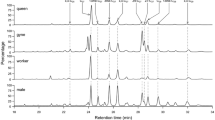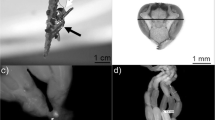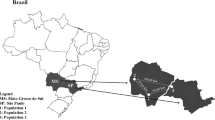Abstract
. Most species of social insect are characterized by a reproductive division of labor among morphologically specialized individuals. In contrast, there exist many species where all individuals are morphologically identical and dominance relationships determine which individuals mate and/or reproduce. In newly founded multiple-foundress associations of the social wasp Polistes dominulus, foundresses establish dominance hierarchies where the top-ranked (alpha) female monopolizes egg laying. The possibility that chemical cues are used for recognition of egg-laying individuals has not been explored in this wasp. Using non-destructive techniques, we examined the relationship between ovarian activity and the proportions of cuticular hydrocarbons of three female types (dominant and subordinate foundresses and workers) in 11 colonies. Immediately after nest foundation, no differences were found between alpha and subordinate females. In contrast, at worker emergence, alpha females were statistically distinguishable from both subordinates and workers. We experimentally removed the alpha female in 5 of the original nests and reanalyzed hydrocarbon proportions of the new dominant individual. Replacement individuals were all found to acquire a cuticular signature characteristic of the alpha female. This suggests that cuticular hydrocarbons are used as cues of ovarian activity in P. dominulus, and we discuss our results in terms of a switch from behavioral dominance to chemical signaling in this wasp.
Similar content being viewed by others
Author information
Authors and Affiliations
Additional information
Electronic Publication
Rights and permissions
About this article
Cite this article
Sledge, M., Boscaro, F. & Turillazzi, S. Cuticular hydrocarbons and reproductive status in the social wasp Polistes dominulus . Behav Ecol Sociobiol 49, 401–409 (2001). https://doi.org/10.1007/s002650000311
Received:
Revised:
Accepted:
Issue Date:
DOI: https://doi.org/10.1007/s002650000311




